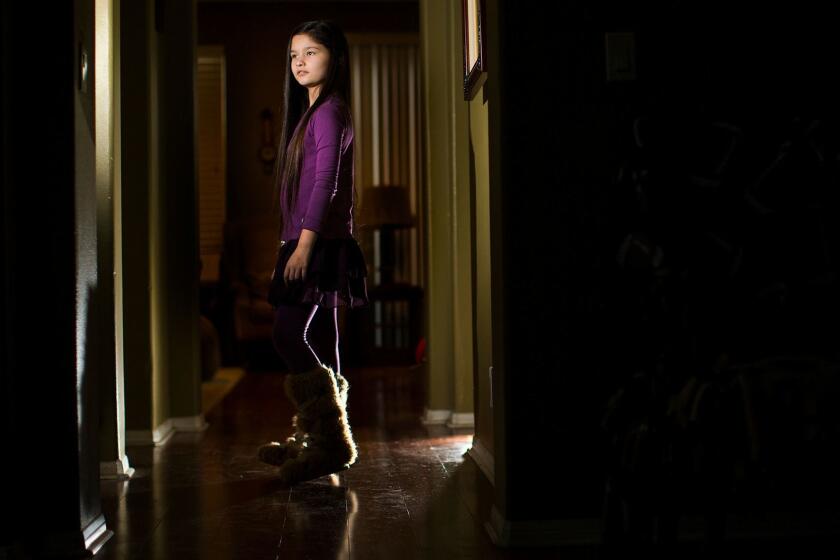Explaining Hollywood: Your child wants to act. What do you need to know?

The acting bug can bite at any age, but when it bites one of your kids, you might soon find yourself trying to navigate strange and potentially treacherous waters as you schlep your child to endless auditions, the occasional callback and, if your child is one of the chosen few, a string of paying gigs.
If you already have a talented young athlete or musician in your home, you may have an inkling about how taxing it can be to support a child actor. But be forewarned: Getting into the entertainment business means dealing with a thicket of labor laws, contracts and financial complications far beyond anything you’ll find in youth sports leagues and high school marching bands.
It’s a steep learning curve, but happily for you, there are a lot of resources out there to help you. For pointers, we caught up with four people active in the Hollywood child-acting scene: Chris Smith, supervisor of the Actors Fund’s Looking Ahead program for young actors; Anne Henry, co-founder of the BizParentz Foundation; Lois Yaroshefsky, a longtime on-set school teacher; and Jeff Yang, whose son Hudson starred in the TV series “Fresh Off the Boat” while in middle and high school.
Here are some of their insights about the issues you’ll need to grapple with and the places you can look to for guidance.
Know your role and your limits
Henry’s three children all acted before moving on to other pursuits, most of them in other fields. In her view, it’s important not to get your own ambitions mixed up with your child’s. “Your kid has to be the driver. They have to want to do this,” she said.
But even if your child is eager to act, Yang said, that doesn’t mean you have the wherewithal to go that route. “Your family has to have the structure to be able to support the sacrifices that will have to be made,” Henry said, which includes being able “to take a kid to an audition on a moment’s notice, or tape one at night, or take a leave of absence to go on an eight-week film shoot.”
A mother or father who is a child actor’s “primary career parent” could easily spend as many hours in that role as she or he would as a full-time employee. “I basically gave up my job for Hudson’s job,” said Yang, a former cultural columnist for the Wall Street Journal.
If they can’t make those sacrifices, Henry said, parents have to be willing to tell their would-be Doogie Howser that the time just isn’t right to make a play for film and TV work. Instead, they could focus on building their kid’s acting chops at summer drama camp, say, or in community theater.
Smith advised parents to avoid critiquing your daughter or son’s auditions or work; instead, ask how they felt about it and follow their lead. Trying to serve as your child’s acting coach “just creates a barrier between a child and a parent,” he said, adding that it’s hard for a kid to tell what role their parents are playing at any given moment when they’ve taken on more than one.
What parents will almost certainly have to help their child with is handling the pain of rejection.
“The auditions themselves are really challenging,” Yang said, in part because young aspirants have to perform without their parents in the room. And then when you leave the audition, “you don’t know whether you did well or poorly,” he said. If you don’t get hired, no one will tell you — you’ll only hear back if you get the gig.
Yang called the process of getting roles “the ‘Squid Game’ of child actors” because “it’s one of the most cruel and challenging and heartbreaking of competitions.” Most kids are cast as part of a family or a group of friends, which means productions are looking for a child whose ethnicity, race and appearance will match a specific niche. And although Hollywood is becoming more inclusive, “it is far easier to cast a white kid,” Yang said. “You can be perfect, but not perfect for the role.”
Actors who have chosen to pursue Hollywood later in life as a second career share their experiences and advice.
Have realistic expectations
Henry said TikTok, Instagram and YouTube have persuaded more kids that anybody can make money by stepping in front of a camera. But the reality of the business hasn’t changed, Henry said. The odds remain stacked against anyone launching themselves into Hollywood stardom off the strength of their TikTok dance moves. Almost all of the jobs that pay enough to be profitable still run through talent agents and studios.
(Henry also worries about young children putting their content and image on social media, given the number of predators online. Her organization strongly discourages child actors from using social media in their efforts to be discovered. And besides, she said, it doesn’t work.)
The competition for speaking roles in Hollywood productions remains intense despite all the new content being made for streaming services. According to BizParentz, there were only 15 regular roles for children on new series that launched on networks or streaming services in 2018.
That’s why Henry advises families outside of Southern California to let their kids bloom as actors where they’re planted. “Don’t make extreme sacrifices for something you don’t know that you’re ready for.”
Almost every large city has licensed talent agents, managers, theater companies and “places where you can get good training and experience” without having to pull up stakes and move to Hollywood, Henry said. “You should master that little pool before jumping into that bigger pool.”
Guidance is crucial to starting a career in entertainment, and at some point you’ll need an agent. How and where can you find one who gets you?
You will need help
Most kids get their start as amateurs, Yang said, acting on student productions or getting small roles through “open calls” — auditions that anyone can attend. To vie for bigger parts on higher-level productions, though, you will need professional representation, which for many child actors means a manager and an agent.
Managers aren’t the ones who book your child gigs. But they can be the ones who introduce your child to writers and producers, who “scan the landscape of what’s possible to make sure their clients are aware of things that might actually match their profiles, and also open some doors,” Yang said. They typically have a small roster of clients, and they’re paid a percentage (often 15% to 20%) of their client’s earnings.
Agents, meanwhile, are licensed by the state and have the power to arrange auditions and negotiate contracts for their clients. They will be alerted by producers to “a whole matrix of potential slots and potential roles and potential opportunities” for their clients, Yang said, and they’ll steer individual actors toward the ones they fit. They typically collect 10% of the money their clients make from the contracts they negotiate.
Beyond managers and agents, there is a laundry list of other professionals out there waiting to help your child blossom — for a fee. Sadly, as in many talent-related industries, scammers abound, as do self-described experts who are more skilled at cashing checks than helping your child land speaking parts.
In California, state law bars anyone in the “talent representation” business — managers, casting consultants and the like — from promising to obtain gigs for an actor in exchange for an up-front fee. Instead, “talent services” can charge for training and advice, but they must offer refunds and post bonds. Those are important protections against scammers.
State law also requires that talent services that work with minors obtain a permit and pass an FBI background check designed to weed out registered sex offenders.
Those laws don’t apply in other states, which often have little or no legal protections for child actors, Henry said. Nor do they help parents distinguish between capable professionals and hacks.
Amelia Su-Lin Crawford stood near the corner of the expansive ballroom and handed out coupons to children’s clothing store Little T’s Boutique.
Smith said that it helps to join a community of parents of child actors because “people talk” — word spreads about bad apples. But, he added, “Do your due diligence.”
That means scouring the web, social media and online reviews for information on the people they’re thinking of hiring. BizParentz offered more than 3,200 words’ worth of tips and suggestions for how to do this research, advising, “Your child’s safety (and your wallet) depend on you.”
One place to start is Amazon’s IMDb.com, which tracks the credits earned by film and TV industry professionals. Look for people with credits in productions you’ve heard of, who’ve “worked in the industry in a recognizable way,” Henry said.
Similarly, she said, if your child is looking to join a theater company, do a Google search to see if the group has its own performance space and if it has done “recognizable theater productions.” Avoid any “pay to play” group that requires you to buy a block of tickets so your child can participate, she added.
One thing BizParentz recommends is to pay for a single session — an assessment or consultation — with an acting teacher to get his or her thoughts on your child’s strengths and weaknesses. “That’s when you also can see if you vibe with this person, see if they give you the creeps,” Henry said.
But never, ever agree to meet someone at a hotel, she said. “You never buy anything in a hotel; you never go to a hotel. Ever. Most of the scams do their things online or in a hotel.”
While you’re evaluating the people you’re hiring, you’re also measuring your child’s interest and commitment, she said. “You’re trying to find out if your kid can do this” — whether their desire to act will stand up to the demands of the job.
Know your boundaries
Smith said it’s OK to want to be a child actor, “but you can’t want it to the point of sacrificing everything.” Canceling soccer games, birthday parties and vacation trips because you’re waiting to book a gig can become problematic for the kids as well as the parents.
There’s also a risk of creating a hierarchy among a family’s children if the child actor’s schedule and commitments always trump those of the non-acting siblings.
If you decide to pull up stakes and relocate to Southern California so your child can pursue more gigs in Hollywood, Smith said, that’s your decision and you need to own it. And if your child decides two years later to drop acting in favor of playing video games, rescuing shelter pets or pursuing some other hobby, he said, “go see a therapist, talk to your friends, share your loss — but don’t take it out on the kid.”
Your child will feel guilty enough about leading the family into a Hollywood cul-de-sac, and probably will stick with acting longer than he or she should as a result. That’s why it’s essential for your kid to know that the family “can always talk about this if it’s not working,” Smith said.
Parents also need to consider the material their kids may be exposed to as an actor, Smith said. “How do they feel about their kids being introduced to language, to violence on set. ... Do I want to have conversations with my kids about these adult topics?”
Disembodied voices are ubiquitous in the media, reflecting the growing demand for voice actors. It’s a highly competitive industry that’s tough to break into; here are some tips.
Help your child have a life outside acting
Smith said that the child actors who’ve been successful “in life, not just in the industry” are the ones who had a robust safety net of parents and kids outside the film business.
That can be a challenge for a kid who’s working steadily. Yang said that proms and graduation ceremonies, family vacations, and even just chances to hang out with friends can get sacrificed on the altar of shooting schedules.
“Even if his outcomes have all been pretty good so far,” Yang said, his son’s choices early in his acting career “unquestionably led him to sacrifice part of his childhood. ... I think if we had both known then what we know now, we would have really worked hard to ensure that some of those experiences were made more available to him, however possible.”
Acting is work, Smith said, and there will be times when kids don’t feel good about their performances. Spending time with friends and hobbies that are distinct from Hollywood, Smith said, “gives them a healthy break and a detachment from it.”
But as much as parents may need the help of other Hollywood parents, they also need to be able to hang out with friends who aren’t in that circle, Smith said. And like their kids, they need to have hobbies that let them escape from the acting business.
School isn’t an option — it’s a mandate
California requires every set to have a state-credentialed studio teacher to help child actors with both their education and their welfare. Kids who are 6 through 17 years old have to log at least three hours of schoolwork daily, with each session lasting at least 20 minutes.
But the teachers on set aren’t providing the curriculum, said Yaroshefsky, who taught elementary school and special education classes before becoming a studio teacher 31 years ago. “What we expect is for every child to bring at least three hours of work from school with them,” she said, adding that if a school won’t provide the material, then parents should buy textbooks appropriate for their child’s grade level.
Under state law, a production can’t make children stay late to get their three hours in. Instead, those hours count against the maximum hours child actors can spend on set, which range from 8 1/2 hours for 6-year-olds to 10 1/2 for 17-year-olds.
Ever wondered how they get a dog to smile on camera? That’s the job of the animal trainers working behind the scenes.
Don’t be ‘that parent’
If your child manages to land a spot in a film or TV show, you’ll need to know how to behave on set and what’s expected of you. The problem, Yang said, is that there are “so many logistical things, so many protocols that are important to know so you’re not that parent,” but there aren’t a lot of good places to learn the unwritten rules.
The absolutely best resources, he said, are other parents who’ve gone through the drill. “Find somebody who’s been through the process to learn the language of how to tell your children what to expect, emotionally and psychologically, not just procedurally,” Yang said.
In California you have the right to be within seeing or hearing distance whenever your child is working, Yaroshefsky said, and parents are expected to accompany their children on meal breaks and to makeup and wardrobe sessions.
But the kids hired as background actors are supposed to keep their distance from the principal players, as are their families. This group brings up the rear at meal times, and the parents will have to supply their own chairs if they want to sit down on set.
“It makes it so much easier on everybody if they come in knowing” what’s expected of them, Yaroshefsky said. It also helps if children have been fed before they show up in the morning, rather than trying to squeeze in breakfast on a busy set.
Community resources
Here are some places that can help you handle the challenges of parenting a child actor:
- Looking Ahead: Developed in part by SAG-AFTRA, Looking Ahead offers a number of programs to actors ages 9 to 18 in Southern California and New York City, including industry seminars, individual and family counseling, educational and career guidance, and group activities for kid actors. The Los Angeles branch is open to young actors who are represented by a manager or agent and who are either union members or have earnings that meet the program’s threshold.
- BizParentz.org: Henry and fellow parent Paula Dorn founded the organization to help explain new revisions to a state law that requires a portion of a minor actor’s earnings to be placed into a trust until the child turns 18. The nonprofit’s website now offers free information and advice on state laws that protect child actors, talent-services scams and how to avoid them, and a number of other topics.
- Hollywood Mom Blog: This blog and accompanying newsletter and Facebook page is heavily oriented toward getting gigs for child actors. In addition to including notices of casting calls, it also offers lists of classes and workshops for young actors and of talent services, such as casting counselors and headshot photographers. Unlike BizParentz’ site, the blog accepts some advertising.
- SAG-AFTRA: The Screen Actors Guild — American Federation of Television and Radio Artists devotes part of its website to young performers and their parents, offering answers to frequently asked questions and some links to useful resources. It’s aimed at union members, though.
- The Studio Teachers: A project of the International Assn. of Theatrical Stage Employees Local 884, this site provides a directory of certified studio teachers and their work histories. It also has a useful chart detailing how much time child actors in each age group must spend with a teacher and how many hours per day they are allowed to remain on set.
Send the L.A. Times your questions about breaking into and working in the entertainment industry.
More to Read
Inside the business of entertainment
The Wide Shot brings you news, analysis and insights on everything from streaming wars to production — and what it all means for the future.
You may occasionally receive promotional content from the Los Angeles Times.

















